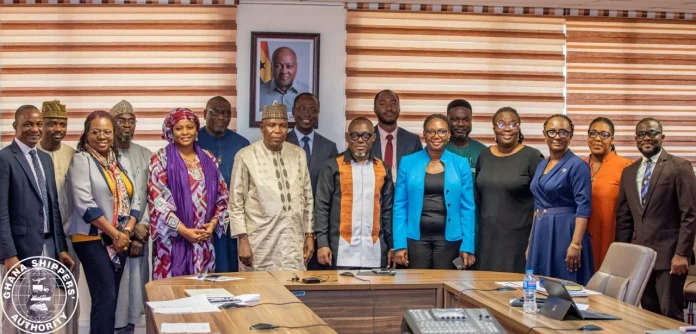Ghana and Niger have signed a fresh trade agreement aimed at eliminating the costly delays and bureaucratic hurdles that have plagued their shared transit corridor for years, as both countries position themselves to capture more regional logistics business.
The Memorandum of Understanding, signed in Accra, commits the two nations to harmonizing customs procedures, strengthening cargo tracking, and tackling the extortion and multiple checkpoints that drive up costs for traders moving goods between West Africa’s coast and its landlocked interior.
For Ghana, the pact represents an opportunity to cement its role as the preferred gateway for Niger, Mali, and Burkina Faso, three countries that depend heavily on coastal access for imports and exports. For Niger, it offers hope of reducing the transportation costs that make doing business more expensive than in neighboring countries with better corridor efficiency.
Prof. Ransford Gyampo, Chief Executive Officer of the Ghana Shippers Authority, told the signing ceremony that persistent operational challenges have been eating into the corridor’s competitiveness and driving traders to consider alternative routes through neighboring countries.
He identified value added tax on transit cargo, lack of transparency in cargo handling, numerous security checkpoints, extortion by officials, axle load enforcement issues, and general security concerns as the primary factors undermining smooth trade flows.
“Central to the challenges commercial operators face on Ghana’s corridor include VAT on transit cargo, non transparent handling of goods, numerous checkpoints and related extortions, axle load problems, and security issues. These add to the cost of doing business and reduce competitiveness,” Gyampo said.
The agreement establishes a technical committee tasked with monitoring implementation, conducting research, providing training, and resolving disputes as they emerge. It’s a mechanism designed to ensure the pact doesn’t gather dust like previous agreements that failed to translate into meaningful operational improvements.
Gyampo urged all transit shippers to register with the Ghana Shippers Authority under the new Ghana Shippers’ Authority Act, 2024 (Act 1122). The registration requirement, he explained, would help sanitize the transit system by creating accountability and reducing opportunities for fraudulent practices.
The database generated from registration will be shared with the Niger Shippers’ Council, creating a coordinated approach to tracking cargo and identifying bad actors in the system.
“Importantly, this data will be shared with our partners at the Niger Shippers’ Council to facilitate smoother trade flows, enhance coordination, and strengthen mutual trust between our two institutions,” Gyampo said.
He also highlighted the Boankra Integrated Logistics Terminal currently under construction in Ghana’s interior. When completed, the facility is designed to serve as a dry port for landlocked countries, potentially reducing transport costs by 14 percent for cargo routed through Tema Port and up to 48 percent for goods moving through Takoradi Port.
The terminal aligns with Ghana’s broader 24 hour economy policy, which aims to keep strategic sectors like logistics, manufacturing, and transport operating around the clock to boost productivity and competitiveness.
One contentious issue addressed in the discussions was enforcement of ECOWAS axle load limits, which has faced resistance from some Ghanaian truck drivers who argue the regulations hurt their earning capacity. Gyampo said the Authority would work with transport unions to roll out sensitization programs aimed at ensuring compliance without disrupting trade flows.
“We are working closely with our transport partners to promote compliance with regional standards and ensure trade flows are not disrupted by misunderstanding or noncompliance,” he said.
Colonel Major Souley Ibrahim, Director General of the Niger Shippers’ Council, commended Ghana for taking concrete action to address bottlenecks rather than simply talking about reform.
“This MoU reflects our shared responsibility to promote efficiency and strengthen trade between our two countries,” Ibrahim said, reaffirming Niger’s commitment to enforcing axle load regulations and harmonizing customs procedures.
The latest agreement builds on earlier MOUs signed in 2000, 2007, and 2018, but expands the scope to address new challenges in regional logistics and incorporate digital trade facilitation tools that weren’t available during previous negotiations.
Officials from both countries say the renewed partnership should help lower costs, boost corridor efficiency, and strengthen Ghana’s competitive position as West Africa’s landlocked nations evaluate which coastal gateway offers the best combination of speed, cost, and reliability.
With the African Continental Free Trade Area promising to increase intra African commerce, efficient transit corridors have become increasingly valuable economic assets. Ghana and Niger are betting that their renewed cooperation will position them to capture a larger share of that growing trade.
Source: newsghana.com.gh











